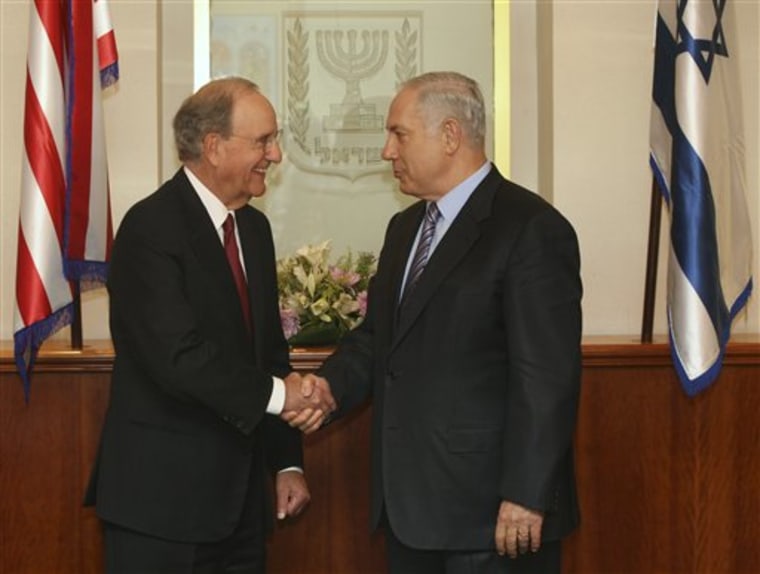Israel's prime minister and the top U.S. Mideast envoy said they made progress Tuesday on their dispute over West Bank settlements, but offered no sign of a breakthrough at a meeting in Jerusalem.
President Barack Obama's envoy, George Mitchell, has been pressing Israel to halt all construction in settlements built on captured land claimed by the Palestinians, stressing that such a gesture would improve prospects for a peace deal. But Israeli Prime Minister Benjamin Netanyahu says limited construction must be permitted to allow "natural growth" in the existing settler population.
Netanyahu and Mitchell both reported "progress" after their meeting, but gave no details on how close they were to resolving the disagreement.
"I think we're making progress toward achieving an understanding that would enable us to continue, and in fact complete, a peace process that would be established between us and our Palestinian neighbors and ultimately the entire region," Netanyahu said.
'Friends and allies'
The settlement issue has given rise to the worst public tensions between Israel and its closest ally in nearly two decades.
Seeking to calm Israeli nerves, Mitchell stressed Tuesday that Israel and the U.S. were "friends and allies." But he offered no hint that an agreement was near and said only "good progress" was made.
On Monday, Mitchell said Israel must start "dealing" with its West Bank settlements as a step toward bringing a comprehensive peace to the Middle East. The Palestinians have refused to restart negotiations with Israel unless Netanyahu freezes all settlement activity.
Mitchell is one of four senior U.S. envoys visiting Israel this week, all part of a U.S. effort to forge a wider peace that would end Israel's conflicts with the Palestinians, Syria and Lebanon and normalize Israel's ties with the rest of the Arab world.
"That is our objective, and it is to that which we have committed ourselves fully," Mitchell said after meeting Netanyahu.
On Monday, U.S. Defense Secretary Robert Gates met with his Israeli counterpart to discuss Iran's nuclear program. Gates urged the Israelis to give the U.S. more time to pursue its diplomatic outreach to Tehran. Israel has issued strong hints that it is prepared to attack Iran if diplomatic efforts to curb Iran's nuclear program don't bear fruit.
Israel has carried out pre-emptive strikes targeting perceived nuclear threats before. In 1981, Israeli jets bombed Iraq's Osirak reactor, and in late 2007 Israel destroyed a building in Syria that Israeli and U.S. officials identified as a nuclear reactor under construction. Syria said it was an abandoned military facility.
Israel, which itself is widely believed to possess nuclear weapons, thinks that Iran is developing nuclear weapons — a development it sees as an existential threat. Iran could also play a key role in U.S. peace efforts because it has close ties with Israel's staunchest foes, Hezbollah guerrillas in Lebanon and Hamas militants in the Palestinian areas.
Tents and shacks
The pressure on Israel over the settlements by President Barack Obama's administration is exceptional. Previous U.S. administrations criticized settlement construction as counterproductive but have generally tolerated it.
In response to the stepped-up pressure, Israeli settlers set up several tents and shacks on hilltops in the West Bank overnight. Settlement supporters also rallied in Jerusalem on Monday night, holding signs condemning the U.S. administration.
Israel captured the West Bank, now home to some 2.5 million Palestinians, in 1967. The number of Israeli settlers there has more than doubled since the mid-1990s and now stands at around 300,000, in addition to another 180,000 Israelis living in Jewish neighborhoods built by Israel in east Jerusalem, also captured in 1967.
Palestinians see the West Bank and east Jerusalem as part of their future state.
More on Israel
